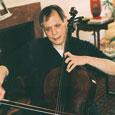In 1966 I was the principal cello of the American Ballet Theater in New York, and my instrument was badly damaged when a strong gust of wind sent the cello case flying across Columbus Avenue. I was left holding the broken handle. I needed a good cello to play and went to Joseph Settin’s shop on West 57th in Manhattan.
I tried several cellos but only one made my heart sing. For some reason Settin refused to sell me that instrument until a legendary violinist, Mischa Elman, walked into the shop. Elman often haunted New York instrument shops in an endless quest for adjustments to his Stradivarius violin. As I played the cello he loved its beautiful sound and exclaimed, “This boy deserves to have a beautiful instrument. Sell him the cello.” Settin yielded and after such a beginning it followed that this instrument became a source of good luck in the ensuing years.
During a tour with the American Ballet Theater, I received an unexpected phone call in Chicago from, Carol Fox the general manager of the Lyric Opera of Chicago of Chicago. Her stentorian voice declared, “I need a principal cellist for next season, and I think you are it. Come and play for me at 12. The audition went well and I was invited to return several days later for a second audition for her and the artistic director, Pino Donati.
During the audition Donati started to salivate over the sound of the instrument and said, “What a beautiful cello!” I called out to Carol Fox “Tell him that I come with the cello.” At the end of the audition I played Don Juan by Richard Strauss. I ceremoniously pushed the stand to one side and started playing the opening, which I promptly botched.
Carol Fox called out, “That will do.” I felt my flawed performance would not do and started the opening again. After I played for a few minutes, Carol Fox yelled out, “Uncle! How much money will it take for you to live in the style to which you would like to become accustomed?” I have performed with the Lyric Opera of Chicago ever since.
I knew that a great deal of my future depended on how well I played the cello part in the first opera of the season, Salome. I practiced endlessly, and the music sounded beautiful on my cello. Because the Lyric was my first major job, I was determined to give a great performance. After so many hours of practice on Salome, the next opera of the season seemed easy by comparison.
The cello I bought in 1966 has not been my primary instrument for many years, but it brought me luck at crucial stages in my career and I have always cherished its beautiful sound. About a year ago I gave this instrument to a gifted student, Katherine Geesman.
I taught Katie for three years and during that time, she went from being a talented student with limited cello skills to winning the concerto competition at Valparaiso University by playing the difficult Boccerini Sonata in A Major. She played a beautiful senior recital on pieces cellists will recognize as some of the most difficult in the repertoire, including the Schubert Arpeggioni Sonata and the Brahms Sonata in F Major. As she pursues a doctorate at Florida State University, I delight in knowing that she plays such a fine instrument and hope that it brings the same joy and fortune that it did for me early in my career.





